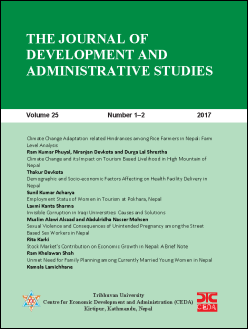Invisible Corruption in Iraqi Universities: Causes and Solutions
DOI:
https://doi.org/10.3126/jodas.v25i1-2.23440Keywords:
Corruption, visible Corruption, invisible Corruption, High EducationAbstract
Corruption is a global phenomenon driving towards the non-productive activities, and its result becomes more risky if corruption is widespread. Corruption in high education institutions has detrimental consequences on the quality of education, the student’s ethics, the future opportunities for students, and the quality of future leadership. This paper aims to explore the role of universities in the spread of invisible corruption at the Iraqi high education sector. The main research problem is an attempt to explore the role of students, academic and other staff in the spread of invisible corruption at the Iraqi high education sector, and what best solution are used to limit its effects. This study pursues both deductive and inductive approach and uses the analysis which is supported by both theoretical evidence and statistical techniques. The study was conducted at the University of Basra and the Southern Technical University, where, the sample included professors with experience and specialization in the field of teaching and analyzing corruption in high education. The results showed limited visible corruption in the Iraqi education sector, while Invisible corruption was the most common in the Iraqi high education sector, because of the difficulty of discovering its practices. The spread of this type of corruption was due to the common interests between students and academic and administrative bodies. This requires Popularizing the culture of integrity and exposing corruption and its dangers in the external and internal community levels of Iraq's high education sector.
Downloads
Downloads
Published
How to Cite
Issue
Section
License
The copyright of the accepted articles is reserved by the Centre for Economic Development and Administration (CEDA), Tribhuvan University (TU). No part of the article published in this journal should be reproduced except provided by the law currently in force without the written consent of the centre.




